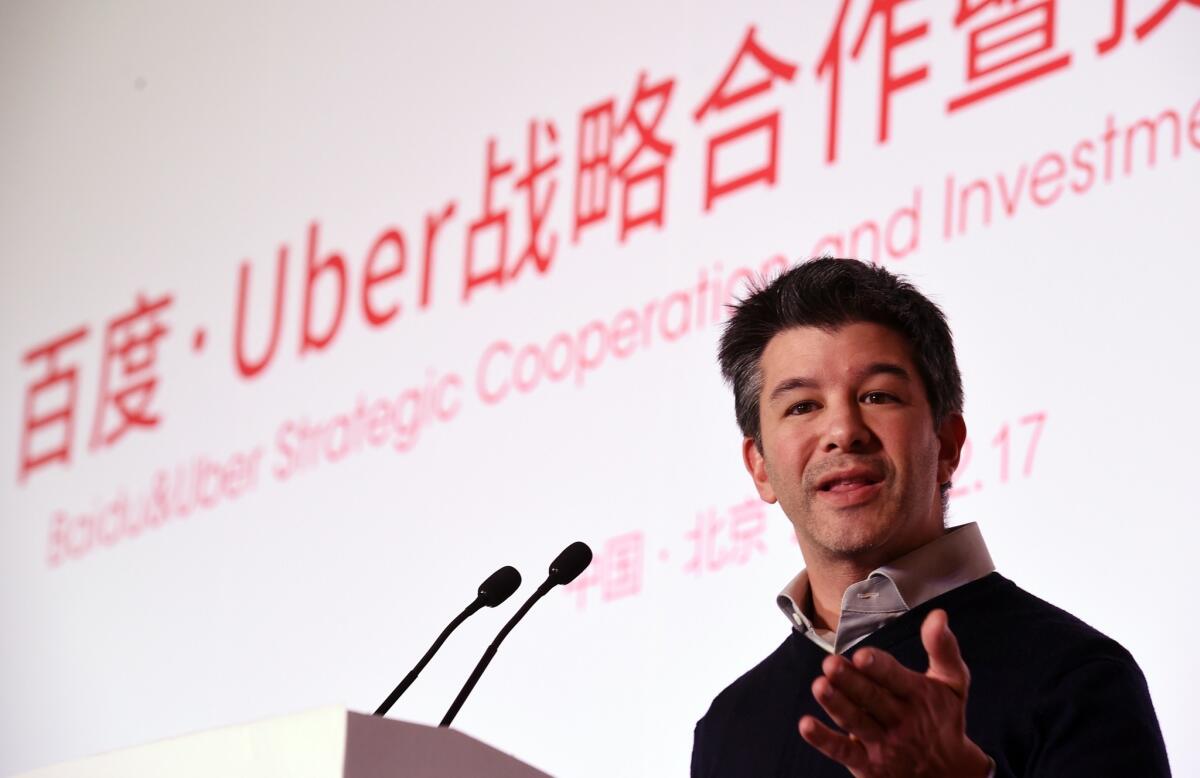Uber China to join rival Didi Chuxing in $35-billion deal

Chinese ride-hailing leader Didi Chuxing has announced plans to absorb Uber’s business in the world’s most populous nation, ending a costly battle between the unprofitable rivals.
Together, the ride-hailing venture would be worth $35 billion, according to a source familiar with the deal but not authorized to speak on the record.
Under the agreement, Didi Chuxing will acquire Uber China’s brand, business operations and data, according to a statement Didi issued Monday.
In exchange, Uber will receive a 5.89% share of the combined entity with preferred equity interest, which is equal to a 17.7% economic interest in Didi Chuxing, the statement said.
Uber China’s previous investors, including Chinese Internet firm Baidu, will receive a 2.3% economic interest in Didi Chuxing.
Initial unconfirmed reports mentioned that Didi would invest $1 billion in Uber’s global business as part of the deal, but Didi’s statement made made no mention of such an investment. Didi Chuxing will obtain a minority equity interest in Uber, the release stated.
Didi Chuxing Chief Executive Cheng Wei will join the board of Uber, and Uber Chief Executive Travis Kalanick will join the board of Didi Chuxing.
A leaked blog post that was circulating on social media Sunday night and published on Uber’s website Monday morning suggested Uber and Didi could finally turn a profit in China if they worked together.
“I have no doubt that Uber China and Didi Chuxing will be stronger together,” the note said.
Yi Beichen, a technology analyst and author of “The Era of Mobile Internet,” noted that Uber’s tie-up with Didi marks yet another example of a big U.S. tech company trying — and failing — to make a go of it as a wholly foreign-owned enterprise in China. Online shop EBay lost out to Alibaba, while Google left amid concerns over hacking and censorship. Yahoo and MSN changed their ownership structures.
“This is the trend,” Yi said.
Analysts had increasingly pegged Uber and Didi as merger candidates. Uber encountered roadblocks soon after it entered China in 2013 and tried to take on the homegrown Didi, which supplies about 85% of the country’s app-requested rides, according to CNIT-Research. During the first quarter, Uber ranked second with nearly 8% market share, followed by Yidao at 3.3% and Shenzhou at 2.9%.
Uber’s peer-to-peer ride business faced government raids, police crackdowns, protests from irritated cabbies and, of course, intense competition.
Uber and Didi offered deep subsidies to attract drivers and riders. As pricing schemes evolved, Didi launched programs to help drivers acquire vehicles through a partnership with China Merchants Bank.
With Uber now under Didi’s roof in China, the company may stop spending heavily trying to lure drivers and customers and enter a new phase where the company can focus more on generating more revenue, Yi said.
Although that may mean the end of highly subsidized cheap rides, it could be good for customers, he said. Now instead of spending money and energy on battling Uber, “Didi can spend more time to improve the user experience,” Yi said.
The legal status of ride-hailing services like Didi and Uber has been hazy in China. But last week, Chinese regulators announced they would legalize ride-hailing apps and issued new rules on licensing, pricing and consumer data privacy.
As the government weighed the decision, the uncertainty was like a “sword of Damocles between Didi and Uber,” Yi said. The reassurance that their entire business model won’t be wiped out could have “directly triggered this merger,” he said.
Uber China is operating in more than 60 cities with plans to reach 100 by year’s end. Analysts have said much of Uber Technologies Inc.’s $62.5-billion valuation hinges on its potential to succeed in China. But Uber has been losing $1 billion a year trying to establish itself there.
Didi has one-upped Uber in fundraising, partnerships and driver subsidies. Didi has financial backing from Chinese internet behemoths Alibaba and Tencent, and previously had launched a partnership with Uber’s U.S. competitor, Lyft. Didi also recently received a $1-billion investment from Apple.
Didi also has the backing of China’s own sovereign wealth fund and, as a homegrown business in a country that has been openly hostile toward foreign technology companies (Facebook, Twitter and Google are blocked in China), carries cultural and political advantage.
It’s maintained more advanced features than Uber, including ones more targeted to Chinese tastes than those of Uber, technology analysts said. Though Uber’s brand might be regarded more highly by many consumers, Didi has benefited from deeper relationships with a variety of Chinese brands such as Alibaba, as well as investment from Apple.
Jeffrey Towson, a professor of investment at Peking University and author of a book on Chinese consumers, noted in an analysis published before the news of the merger that competition between Uber and Didi was heating up in large metropolises outside of Beijing and Shanghai.
The two companies were somewhat matched on a financial resources basis, Towson said. But Didi had many more employees — 4,000 to Uber’s 200.
“I’m not sure how Uber can compete with Didi in terms of manpower over the long run,” he wrote, adding that Didi would be able to “provide deeper and wider services” than Uber.
Towson predicted that they would not be able to co-exist, like Pepsi and Coke, but rather would probably fight to the death.
Yingzhi Yang and Nicole Liu in The Times’ Beijing Bureau contributed to this report.
Yingzhi Yang in the Times’ Beijing bureau contributed to this report.
ALSO
What does Disney want to do with photos of your feet?
German company plugs into L.A. area for its electricity storage operation
O.C. bank’s young CEO has long resume, stellar credentials
UPDATES:
6:42 a.m. Aug. 1: This article was updated to note the blog had been published on Uber’s website.
3:10 a.m. Aug. 1: This article was updated with more information about Didi Chuxing’s investors.
2:40 a.m. Aug. 1: This article was updated with confirmation from Didi Chuxing and more details of the deal.
12:30 a.m. Aug. 1: This article was updated with comments from analysts in China.
10:50 p.m.: This article was updated with additional reporting.
This article was originally published at 10:40 p.m July 31.









